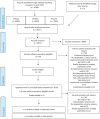Risk of conversion from mild cognitive impairment to dementia in low- and middle-income countries: A systematic review and meta-analysis
- PMID: 35310524
- PMCID: PMC8918697
- DOI: 10.1002/trc2.12267
Risk of conversion from mild cognitive impairment to dementia in low- and middle-income countries: A systematic review and meta-analysis
Abstract
Introduction: With no treatment for dementia, there is a need to identify high risk cases to focus preventive strategies, particularly in low- and middle-income countries (LMICs) where the burden of dementia is greatest. We evaluated the risk of conversion from mild cognitive ompairment (MCI) to dementia in LMICs.
Methods: Medline, Embase, PsycINFO, and Scopus were searched from inception until June 30, 2020. The search was restricted to observational studies, conducted in population-based samples, with at least 1 year follow-up. There was no restriction on the definition of MCI used as long as it was clearly defined. PROSPERO registration: CRD42019130958.
Results: Ten thousand six hundred forty-seven articles were screened; n = 11 retained. Of the 11 studies, most were conducted in China (n = 7 studies), with only two studies from countries classified as low income. A qualitative analysis of n = 11 studies showed that similar to high-income countries the conversion rate to dementia from MCI was variable (range 6 0%-44 8%; average follow-up 3 7 years [standard deviation = 1 2]). A meta-analysis of studies using Petersen criteria (n = 6 studies), found a pooled conversion rate to Alzheimer's disease (AD) of 23 8% (95% confidence interval = 15 4%-33.4%); approximately one in four people with MCI were at risk of AD in LMICs (over 3 0-5 8 years follow-up). Risk factors for conversion from MCI to dementia included demographic (e.g., age) and health (e.g., cardio-metabolic disease) variables.
Conclusions: MCI is associated with high, but variable, conversion to dementia in LMICs and may be influenced by demographic and health factors. There is a notable absence of data from low-income settings and countries outside of China. This highlights the urgent need for research investment into aging and dementia in LMIC settings. Being able to identify those individuals with cognitive impairment who are at highest risk of dementia in LMICs is necessary for the development of risk reduction strategies that are contextualized to these unique settings.
Keywords: dementia; low‐ and middle‐income countries; mild cognitive impairment; risk factors.
© 2022 The Authors. Alzheimer's & Dementia: Diagnosis, Assessment & Disease Monitoring published by Wiley Periodicals, LLC on behalf of Alzheimer's Association.
Conflict of interest statement
Andrea M. McGrattan, Eduwin Pakpahan, Mario Siervo, Daniel D. Reidpath, Matthew Prina, Yueping Zhu, Chen Shulin, and Louise Robinson report no relevant disclosures. Authors who have received grants or contracts from any entity in the past 36 months: Devi Mohan—(1) Dementia toolkit for carers (DeToC): A comprehensive toolkit to support carers of people living with dementia in rural communities. Monash University Malaysia ASEAN grant; Role: Principal investigator. (2) Salivary lactoferrin for early identification of sleep related cognitive decline: A potential target for dementia prevention. Monash University Malaysia, School Strategic Grant; Role: Principal investigator. (3) Pathways of Acquired Epilepsy and their Comorbidities: A Translational Crosstalk between HMGB1 Mechanisms and Gut Microbiome. Monash University Malaysia, School Strategic Grant; Role: Co‐Investigator. (4) Global dementias: Examining structural vulnerability and dementia outcomes. Australian Research Council: Discovery Projects; Role: Partner investigator. (5) Investigating Multimorbidity Through capacity building (MUTUAL). MRC UK‐ GCRF Global Multimorbidity—Seed Funding; Role: Co‐Investigator. (6) Improving early detection and diagnosis of breast cancer among multi‐ethnic rural communities in Malaysia—the implementation of the community education and navigation programme (CENP). Newton Fund Impact Scheme Grant; Role: Co‐investigator. (7) Dementia Prevention and Enhanced Care (DePEC). National Institute of Health Research, UK: Global Health Group (Dementia)‐ (16/137/62); Role: Co‐investigator (all payments made to the institution). Jennifer Yates—NIHR RfPB Co‐investigator Enhance project (all payments made to the institution). Stella‐Maria Paddick—British council science South Asia grant; Broadening our horizons scheme; GCRF funding (Leicester university) for biomarker analysis; all small grants competitively awarded for research costs (all payments made to the institution). All authors who have received funding to travel to attend meetings in the past 36 months: Stella‐Maria Paddick—Cumbria, Northumberland, Tyne and wear NHS foundation trust—travel to Dhaka for a work related meeting; Newcastle University broadening our horizons scheme 2018—reciprocal visit between UK and Chile for one researcher at each site (all payments made to the institution). Blossom C. M. Stephan—NIHR Funded Global Health Research Group on Dementia Prevention and Enhanced care to attend ADI2020 conference (virtual due to COVID‐19; all payments made to the institution). All authors who have been members of external committees (within the past 36 months): Blossom C. M. Stephan—member of the Alzheimer's Society Research Strategy Council (chair the Dementia Prevention Subcommittee); an invited participant to the World Dementia Council, Prevention Workshop, 2021. Stella‐Maria Paddick—on the executive committee of the Royal College of Psychiatrists International Psychiatry and Volunteering Special interest group and attended a number of online meetings. Other financial or non‐financial interests in the past 36 months: Stella‐Maria Paddick—employed by the UK National Health Service.
Figures
References
-
- McGrattan AM, Zhu Y, Richardson CD, et al. Prevalence and risk of mild cognitive impairment in low and middle‐income countries: a systematic review. J Alzheimers Dis. 2021;79:743–762. - PubMed
Publication types
LinkOut - more resources
Full Text Sources


